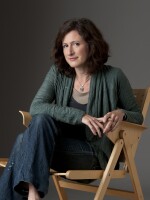Hide/Seek is not exactly hidden, but to find it, you have to thread your way upstairs and through the crowds visiting a hugely popular Norman Rockwell exhibit at the adjacent Smithsonian American Art Museum in Washington, D.C. Hide/Seek: Difference and Desire in American Portraiture at the National Portrait Gallery is a smaller show, but it marks the first time a major museum in the United States has dedicated an entire exhibition to gay and lesbian portraiture.
"To see artwork, all by gay men and women in this country, all exhibited in a place like this -- it's amazing," enthused a visitor, Gary Fisher of Washington, D.C. He added tartly, "It's about time."
The artists are actually not all gay, but the subjects generally are. Co-curator Jonathan Katz is an eminent queer studies scholar and art historian. He agrees that the Smithsonian's involvement is a landmark achievement. "For a gay man of my generation to understand the federal government as a helpmeet was, shall we say, a new feeling," he observed.
Katz came of age as an art historian in 1989, when the Corcoran Gallery of Art canceled a retrospective of Robert Mapplethorpe's photographs. Their confrontational gay and S&M content stirred a furor in Congress. Since then, Katz says, major museums have basically blacklisted exhibitions focusing on gay sexuality. He put together this one with the Portrait Gallery's David C. Ward, and its reviews have been terrific. Ward credits that in part to their different perspectives.
"Jonathan is gay, I'm straight," Ward said. "Jonathan is the outside guy; I'm the inside guy."
Ward says Hide/Seek is one of the biggest and most expensive shows the National Portrait gallery has ever launched, with over a hundred works of art. The show includes an ad for Arrow dress shirts from 1914 that pictures a pair of handsome bachelors enjoying domestic bliss. The illustrator, J.C. Leyendecker, used his boyfriend as one of the models.
Other pieces in the exhibition include a pair of somber grey paintings by Jasper Johns and Robert Rauschenberg. Lovers for six years, the artists completed the paintings during their breakup. And a moving conceptual piece by Felix Gonzalez-Torres, Untitled (Portrait of Ross in L.A.), is a pile of Jolly-Rancher-type candies that weighs 175 pounds. That was the weight of his lover Ross Laycock, who died of AIDS-related complications. Viewers take candies until the piece vanishes, evoking the subject's slow passing -- and his sweetness.
As well as portraiture by well known gay artists, such as Andy Warhol, Annie Leibovitz and Romaine Brooks, Hide/Seek also includes work by straight artists that seem to suggest an appreciation of same-sex erotics. For example, A 1979 portrait, titled The Clearing by Andrew Wyeth, of a handsome young beefcake with flowing blonde hair evokes a male Helga, the artist's female lover of many years.
Ward explained: "Wyeth said when you paint somebody's portrait you fall a little bit in love when them."
Hide/Seek will come to a close the day before Valentine's Day, 2011, but many of its images and much of its scholarship is available on its website.
Copyright 2022 NPR. To see more, visit https://www.npr.org. 9(MDAzMjM2NDYzMDEyMzc1Njk5NjAxNzY3OQ001))






